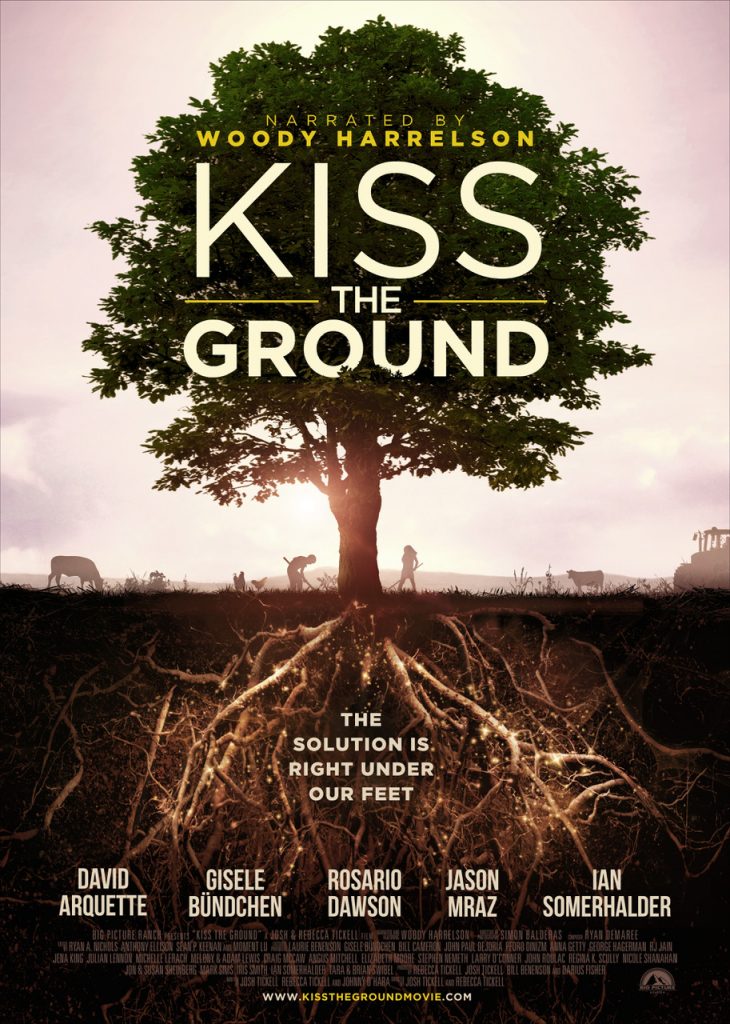
Courtesy of Deborah Anderson
Filmmakers Rebecca and Josh Tickell, along with music royalty, Julian Lennon, have worked tirelessly to produce the film, Kiss the Ground, an important documentary coming to Netflix on September 22nd. The film could not come at a better time, when our planet and the living beings that inhabit it are in need of healing on a grand scale. This film takes a close look at our earth’s most powerful unsung hero, our soil. We quite literally cannot live without it.
Julian Lennon, the first-born son of late Beatles legend John Lennon and his late first wife, Cynthia Powell Lennon, grew up with the weighty knowledge that his father changed the landscape of popular music forever. His mother was a singer, songwriter and artist in her own right who also went on to make her mark on both British and American popular culture. Julian’s own music career has delivered beautifully composed and vocalized hits like Too Late For Goodbyes, Valotte and Saltwater, an impassioned song about humans’ destruction to our planet. Julian Lennon has devoted the majority of his life to humanitarian work with his White Feather Foundation (the white feather is a nod to Lennon’s late father, John), bringing life-saving natural resources to people in developing nations around and doing his part to safeguard our environment.
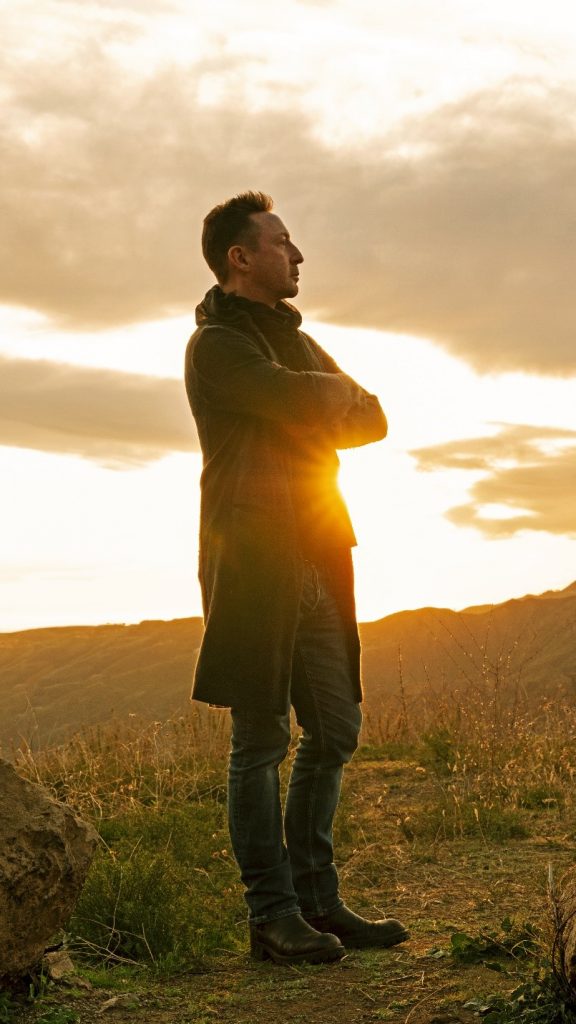
Courtesy of Deborah Anderson
Lennon’s latest project is the film, Kiss the Ground, where he came on board as the film’s Executive Producer, ensuring the project had the talent, funding and resources it needed to be seen by as many of us as possible. Filmmakers Rebecca and Josh Tickell are tireless and extraordinarily gifted documentary filmmakers who co-wrote and co-directed Kiss the Ground, and as Rebecca Tickell explains, “Due to COVID-19, never has there been a time on our planet when wellness has been such a priority for so many. When most of us think about wellness we think of our own bodies. It is easy to miss that our wellness is a function of the ecosystem we live in.”
“It’s a healthy ecosystem, healthy soil, and healthy food that leads to healthy people,” says Josh Tickell. “The inverse is also true, and we are living the proof of that now. If we want to live to our fullest potential as the caretakers of this great garden we call earth, we need better manuals, better narratives, and a better framework for co-existing with our beautiful planet.”
With their film, Kiss the Ground, their goal is to tell a new story, which in some ways is an ancient story of how to live in a way that creates the most health for the most people, while also regenerating the ecosystem that sustains us. When I ask the Tickells what Julian Lennon’s involvement has brought to their film, they tell me Lennon is “a rare human being with magical gifts.”

Courtesy of Deborah Anderson
In 2011, Lennon serendipitously attended a party that Rebecca and Josh Tickell were hosting at the Cannes Film Festival for the premiere of their film, The Big Fix, and remained in touch. “He was so moved by the idea of Kiss the Ground,” Josh Tickell beams, “that he came on board as an Executive Producer and has been helping ever since.” In addition to Julian Lennon’s work behind the camera, Woody Harrelson, Ian Somerhalder, Patricia and David Arquette, Rosario Dawson, Jason Mraz, Gisele Bundchen and Tom Brady appear in the film. Their collective passion for cultivating a healthier planet is obvious from the moment they each step onto the screen.
Allison Kugel: You came on board as Executive Producer of Kiss the Ground later on in production. Did you learn about the film through your White Feather Foundation?
Julian Lennon: I heard about the film through a longtime English friend, Darius Fisher, who is an incredible editor and producer, himself. I knew of some of his previous work with Rebecca and Josh Tickell (co-directors/writers of “Kiss the Ground”) and I always loved the stuff that Josh and Rebecca have done. A few years ago, Darius said they were in the early stages of this interesting project called Kiss the Ground and were looking for guidance, support, and sponsorship; whatever I could possibly bring to the table. They showed me some of the earlier [footage] and immediately I fell in love with the project and wanted to be part of it.
Allison Kugel: In our modern times most of us are quite disconnected from how we get our food. When we think of food insecurity, people equate it with money or the lack thereof. Most people think if they have plenty of money, they will always have plenty of food. Obviously, money is a key element here, but the part of the equation that people are missing is that the true source of our ability to feed ourselves, the true wealth, is in the earth and in our soil, which is currently compromised and proving to be a finite resource.
Julian Lennon: Yes, absolutely. I think 80% or 90% of people don’t realize the value in soil and its health. That is one of the points that comes across in this film. Without healthy soil, we’re all screwed. As they say in the film, there are more organisms in a handful of soil than there are billions of stars in the universe. Trying to get your head around that to start with is a pretty big one, but understanding that biodiversity in our soil and in our food is such an important relationship for us and all living species is key. It’s about understanding and tying that to microclimates and how one thing leads to another. Without one, the other cannot survive. It is a necessity to keep the soil, and your localized soil, as healthy as it possibly can be. It is for the benefit of all. We could talk about this for hours (laugh).
Allison Kugel: Up through the very early 20th century, human beings had to work much harder for their food. They had to work hard to eat. They had to plant their fruits and vegetables, milk their own cows, raise their own chickens, cultivate their own eggs. As a result, I think they were much more connected to the life cycle and what it takes to feed ourselves.
Julian Lennon: Correct. And a lot of my friends and I now have greenhouses. I’m now growing all my own vegetables. I think a lot of people are really beginning to understand, especially in today’s world where a lot of people are becoming sick, the relationship between health and food. In today’s world you see so many people becoming sick from chemicals that are put, not only into our water, but the run-off from the methods of farming of the last 50 years. These so-called modern farming methods have gone on to destroy so much goodness in the world. A lot of people are finally recognizing the relationship between these chemicals and the way farming is done today, and their own health. The cancer rates are up tenfold, if not one hundred-fold, from what they used to be. I honestly believe it all comes down to what we have been feeding ourselves over the last 50 years, and even before that. I also think a lot of us were not aware of that situation, and I wouldn’t say only governments are to blame, but certain farming cultures were doing this without our knowledge in their farming on such a mass scale.
Allison Kugel: There were two things explained in this film that I didn’t know. One, I thought tilling the land was a good thing. I thought you had to till the land to plant seeds. As it turns out, tilling the land degrades and deteriorates our earth’s soil. Two, I thought dirt and soil were synonymous. After becoming educated from this documentary, I am a bit embarrassed about what I didn’t know, but grateful to have learned it.
Julian Lennon: Well, in the film you can see that we are actually educating farmers on how to farm properly again, and to realize that at the end of the day, even with finances coming into play, doing it organically is not only healthier for everybody, but you can make a better buck out of it, and know that you’re doing the right thing for everybody involved. It’s not only for this generation but for generations to come.
Allison Kugel: I’m glad this documentary found a home at Netflix, because Netflix has become this amazing superhighway of information for people.
Julian Lennon: I absolutely agree with that. Netflix is a good home, but it still needs to be seen and still needs to be heard. I have personally felt that there is still a lot of crap out there with some of the documentaries coming forward, that have no clarity to them. What I believe with our film Kiss the Ground is there is absolute clarity and absolute awareness of solutions within our film. With a lot of the documentaries I see these days, they leave you wondering, “Well, what do I do next? What are the answers?” Thankfully, I think this film leaves you with answers as to what we can do to make a difference and have a healthier world and a healthier planet.
Allison Kugel: Let’s talk about composting. There was a part of the film I thought was interesting, where they were showing how in San Francisco, composting has become a way of life for the entire city. Everyone has their compost bins and civil servants collect everyone’s compost along with all other recyclables like plastic and paper. Can you explain exactly what composting is and how people can compost on their own?
Julian Lennon: I’m not a scientist. I’m a layman too (laugh).
Allison Kugel: Well, from one layman to another (laughs). From your personal experience…
Julian Lennon: All I do know is that with the breakdown of food, I compost at home, and it helps regenerate the soil and fertilize the soil that I’m using to grow my own food in.
Allison Kugel: How do you compost at home? Share with us how you do that.
Julian Lennon. I have a compost bin (new and used compost bins are available for just about any budget) that all leftover food scraps go into, and that stays in there for a few months at a time. Then I use that as a fertilizer for the food that I’m growing. That’s how it operates and how it has worked for me. It’s fantastic, the way it works.
Allison Kugel: So, you just put the loose scraps of organic food waste into a compost bin, let it sit for a recommended amount of time so that it can break down, and then you add it to your soil?
Julian Lennon: You’ve got it. I’ve only just started getting into all of this myself, since this lovely year started (laughs), so I’m a newbie. All I know is that it works, and it is a good way to move forward chemical-free. I’m also out at a few garden centers these days, which I love to do, and they now have professional compost bins. There are a few I have my eye on. I just need a few moments to dig in and do my research on which ones are the best for my situation. The pro ones make it so easy to compost your food. They’re not an expensive thing to do, and I think if you are going to try and grow your own food in whatever capacity, composting is going to be a much better thing for the overall health of your food, your soil and our planet.
Allison Kugel: I know you are an Executive Producer on this film. However, I’m curious why you didn’t want to be on camera? People should know about the work you do advocating for natural resources all over the world.
Julian Lennon: I never saw myself in the project as such. I came along as a supporter to bring all the elements together. Had we sat down and talked about it, I would have been there in a heartbeat to do it. I was coming in as a friend, as a supporter, and I just didn’t see it from that perspective, in terms of being in the film. For the most part, it was a project where we already had most of its parts filled in. Yes, I could have jumped in there, but it didn’t need me. I don’t think this will be the last film of this kind that I’ll be supporting. So, perhaps next time around. I’m just glad I was able to be there to introduce this to outside sponsors and supporters, and that other producers came on board.
Allison Kugel: One bit of information in the film is that we only have enough healthy and fertile topsoil for about 60 more years of harvesting. That really blew me away.
Julian Lennon: There are absolute changes that we could still implement to turn the negative around on all the environmental and humanitarian issues we face. There are some amazing professionals in this world that are working so hard regardless of political scenarios and governmental problems and trying to turn things around. There are incredible people at hand that really are doing the best they can. Certainly, I would have to say Josh and Rebecca and this film sit at the top of the table, if not at the head of the table, with trying to put forward a positive change for environmental and humanitarian issues moving forward
Allison Kugel: What is the connection between eating locally grown, organic plant-based food and protecting or regenerating the soil on our planet?
Julian Lennon: A long time ago I was at a dinner in the UK sitting next to the [Italian] actress Greta Scacchi. At the time I was young and into the pop world, and really hadn’t been involved in environmental issues at all at that stage. But she said to me at the dinner table, “Excuse my French, but why are they serving this fucking Evian water when we could be drinking locally sourced water?!” She really went off on it, and I couldn’t understand what it was all about at first. Then, of course, she went into explaining and she began to change my thinking about all of this. Greta raised the important point, “Why are they shipping bottles of water around the world to other parts of the world?” And just discussing the insanity of it all made sense to me. The cost of it, the pollution of it, alone… we’re talking 30 years ago and I was horrified to learn about that scenario and what it’s doing to our world, not only the soil but the oceans too. That moment made a heavy imprint on me and it’s been a long time now that I just shop locally. I know the butcher, the baker, the candlestick maker in my local areas now. I know everything about where things come from, and it’s all locally orientated.
Allison Kugel: How has buying locally changed your life for the better?
Julian Lennon: For my personal experience, I have all kinds of allergies. Certainly, since I have been eating locally grown food and honey, I have not had any of the issues that I had before with allergies or illnesses. You become part of the little universe you inhabit, and I think that’s an important role each of us can play. Obviously, it is more difficult when you’re living in cities. But I also know there are a lot of projects moving forward where in some cities, a lot of buildings are now incorporating the growing of food within interior greenhouses or even rooftops of cities. Some cities are now designing buildings with the idea that they are almost living buildings.
Allison Kugel: There are urban co-op gardens. I know people who have started some.
Julian Lennon: It’s a major step forward. I eat what is available when it’s available, locally. For me, that has made a major difference in life and I think this film also is a step towards other people understanding how it benefits all of us.
Allison Kugel: I have to ask you the spiritual question that I ask everyone. What do you think you came into this life as Julian Lennon to learn, and what do you think you came here to teach?
Julian Lennon: I would have to say that it’s about compassion and empathy. I obviously have found myself in a very unique position in life, and I’ve had a choice in which direction I could’ve gone in. I believe that really it was my mother (the late Cynthia Powell Lennon, first wife of the late John Lennon) on the spiritual front who influenced me, through discovering and observing what she went through in her life. It made me a better person, and I wanted to make her proud in anything and everything that I was doing. To do that one needs to be as good a person as one can be. I have obviously taken that on board and that has been a hugely important lesson for me. Because of the choices I have made, I’ve been able to travel around the world, from the standpoint of my photography, and also with the White Feather Foundation (Lennon’s non-profit foundation).
Allison Kugel: What are some of your past charitable excursions you are most proud of?
Julian Lennon: Oh, going to Ethiopia to see the water wells, going to Colombia and meeting with the Kogi Tribe, which is one of the oldest tribes around. Doing a documentary about the Aboriginals in Australia. Not that I do it to feel good, but I do feel better as a person when I’m trying to do better work and educate people further, whether that’s through music, photography, documentary films, or otherwise. I also feel you cannot shove this stuff down people’s throats. It is about affecting the right balance and causing enough interested people to want to do something about it or want to learn more. I feel I’ve been pretty good at that, whether it’s been through songs like Saltwater or through the documentary work, or through my photography. That’s all part of my purpose, I think. It’s passing on the education, the world education that I have learned through the travels of work that I do. Sometimes, especially with the news and the world today, things have become so insular that you forget there is another world out there.
Allison Kugel: What do you hope the audience will take away from watching this film?
Julian Lennon: I hate to be blunt, but if you kill the soil, you kill yourself. We all depend on each other, from the smallest atom to the largest living organisms in this world. We are all connected. That is what I think people must realize. When you do something, it affects not only you, but everybody else too. Being aware of that allows you to be a bit more understanding in the problems that we face.
Allison Kugel: What can people do in their own community to contribute to the rejuvenation of our earth and our soil?
Julian Lennon: Do everything locally. That is what my takeaway from this film, Kiss the Ground, and this movement would be. Not only on the pollution front and the horrendous stuff we do in the world, but by keeping it local you can keep it clean, and fresh. That is the important takeaway.
The new movie Kiss the Ground, premiering September 22nd on Netflix, focuses on soil regeneration and how it can help climate control. Visit KissTheGround.com and follow on Instagram @kissthegroundmovie. You can also join the movement on Instagram @kisstheground.

Events
Paramount+ Reveals Official Main Title Sequence for the Upcoming Series TALES OF THE TEENAGE MUTANT NINJA TURTLES
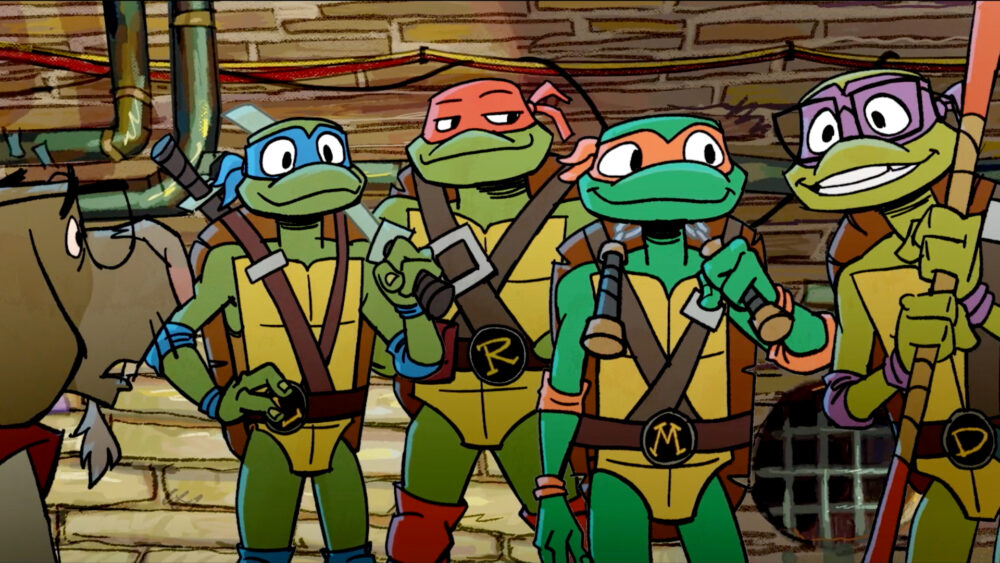
During the TALES OF THE TEENAGE MUTANT NINJA TURTLES panel earlier today at San Diego Comic Con, Paramount+ revealed the official main title sequence for the series. The sequence is composed by EMMY® nominee, Matt Mahaffey, known for his work on Sanjay and Craig, Rise of the Teenage Mutant Ninja Turtles, and Rise of the Teenage Mutant Ninja Turtles: The Movie and much more.
From the studios of the Mutant Mayhem film, the all-new Paramount+ original series TALES OF THE TEENAGE MUTANT NINJA TURTLES explores the adventures of everyone’s favorite pizza-loving heroes as they emerge from the sewers onto the streets of NYC. Leo, Raph, Donnie and Mikey are faced with new threats and team up with old allies to survive both teenage life and villains lurking in the shadows of the Big Apple. The series is produced by Nickelodeon Animation and Point Grey Pictures.
TALES OF THE TEENAGE MUTANT NINJA TURTLES is executive produced by Chris Yost (The Mandalorian, Thor: Ragnarok) and Alan Wan (Blue Eye Samurai, Rise of the Teenage Mutant Ninja Turtles, Teenage Mutant Ninja Turtles [2012 Series]). Production is overseen for Nickelodeon by Claudia Spinelli, Senior Vice President, TV Series Animation, Nickelodeon, and Nikki Price, Director of Development and Executive in Charge of Production.
In addition to the upcoming new series, stream all things Turtles on Paramount+.
Events
Comic-Con 2024: Those About to Die Activation
Events
DISNEY+ CASTS DANIEL DIEMER AS FAN-FAVORITE ‘TYSON’IN SEASON TWO OF “PERCY JACKSON AND THE OLYMPIANS”

in Hall H at San Diego Comic-Con, Rick Riordan and Disney+ revealed that Daniel Diemer (“Under the Bridge”) will star as fan-favorite cyclops “Tyson” in the epic adventure series “Percy Jackson and the Olympians.” Diemer joins Walker Scobell (Percy Jackson), Leah Sava Jeffries (Annabeth Chase) and Aryan Simhadri (Grover Underwood) as a series regular. The Disney+ Original series from Disney Branded Television and 20th Television will start filming its second season next week in Vancouver.
Season two of “Percy Jackson and the Olympians” is based on the second installment of Disney Hyperion’s best-selling book series titled “The Sea of Monsters” by award-winning author Rick Riordan. In the new season, Percy Jackson returns to Camp Half-Blood one year later to find his world turned upside down. His friendship with Annabeth is changing, he learns he has a cyclops for a brother, Grover has gone missing, and camp is under siege from the forces of Kronos. Percy’s journey to set things right will take him off the map and into the deadly Sea of Monsters, where a secret fate awaits the son of Poseidon.
Diemer stars as Tyson – a young Cyclops who grew up all alone on the streets, and finds it difficult to survive in the human world. Shy and awkward, with a heart almost as big as he is, Tyson soon discovers that Poseidon is his father, which means Percy Jackson is his half-brother… and that Tyson may have finally found a home.
Diemer recently starred in the Hulu limited series “Under the Bridge” based off the critically acclaimed book of the same name and a tragic true story of a missing teen girl in Vancouver in 1997. He will next star in the indie “Thug” opposite Liam Neeson and Ron Perlman for director Hans Petter Moland. Daniel was recently seen as the lead in the indie “Supercell” opposite Alec Baldwin and Skeet Ulrich and the lead in the film “Little Brother” opposite Phil Ettinger and JK Simmons. Daniel can also be seen in the Netflix series “The Midnight Club” and recently starred as the male lead in the breakout hit Netflix feature “The Half Of It” from producer Anthony Bregman and director Alice Wu. He is a graduate of Victoria Academy of Dramatic Arts in Vancouver.
Created by Rick Riordan and Jonathan E. Steinberg, season two of “Percy Jackson and the Olympians” is executive produced by Steinberg and Dan Shotz alongside Rick Riordan, Rebecca Riordan, Craig Silverstein, The Gotham Group’s Ellen Goldsmith-Vein, Bert Salke, The Gotham Group’s Jeremy Bell and D.J. Goldberg, James Bobin, Jim Rowe, Albert Kim, Jason Ensler and Sarah Watson.
The first season of “Percy Jackson and the Olympians” is available on Disney+
-

 Interviews1 day ago
Interviews1 day agoInterview With Heroes & Villains Creative Director Doug Johnson
-

 Streaming1 day ago
Streaming1 day agoApple TV+ announces season two for delightful kids and family series “Camp Snoopy
-

 Events1 day ago
Events1 day agoThat’s My E Coverage Of The Adult Swim’s Pirate Parrrty
-

 Events14 hours ago
Events14 hours agoParamount+ Reveals Official Main Title Sequence for the Upcoming Series TALES OF THE TEENAGE MUTANT NINJA TURTLES
-

 Events17 hours ago
Events17 hours agoDISNEY+ CASTS DANIEL DIEMER AS FAN-FAVORITE ‘TYSON’IN SEASON TWO OF “PERCY JACKSON AND THE OLYMPIANS”
-
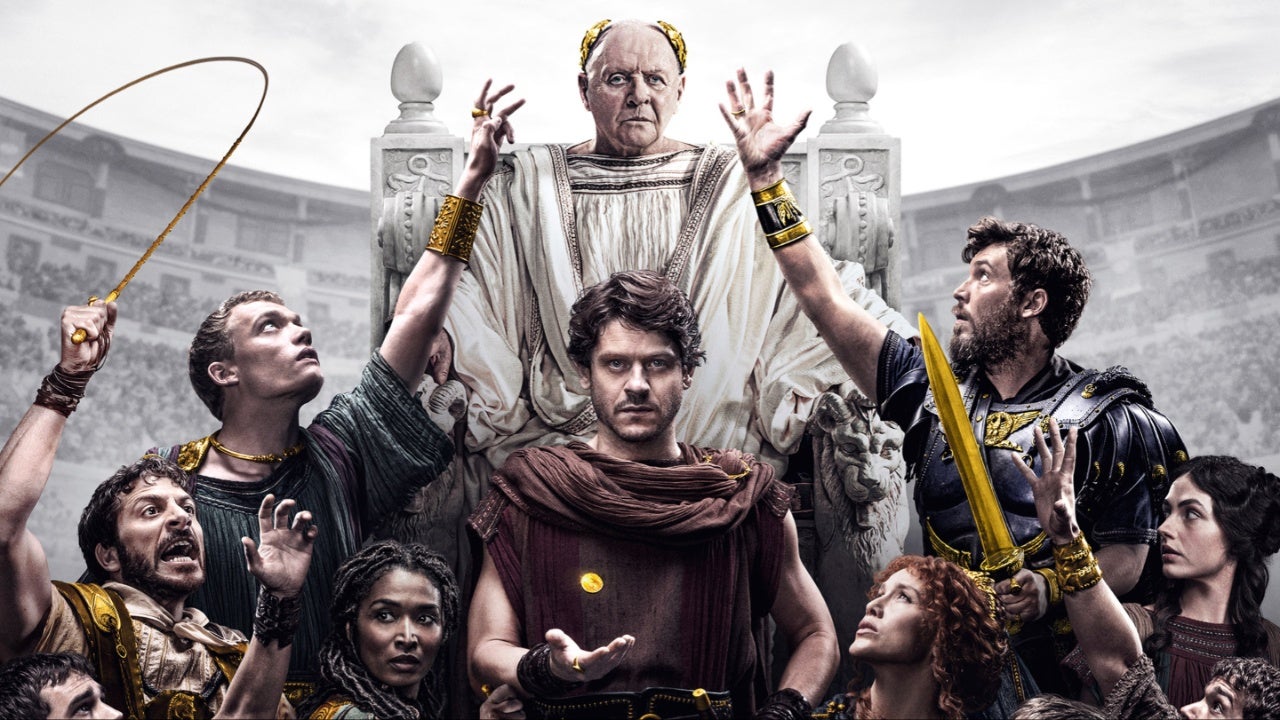
 Events16 hours ago
Events16 hours agoComic-Con 2024: Those About to Die Activation
-
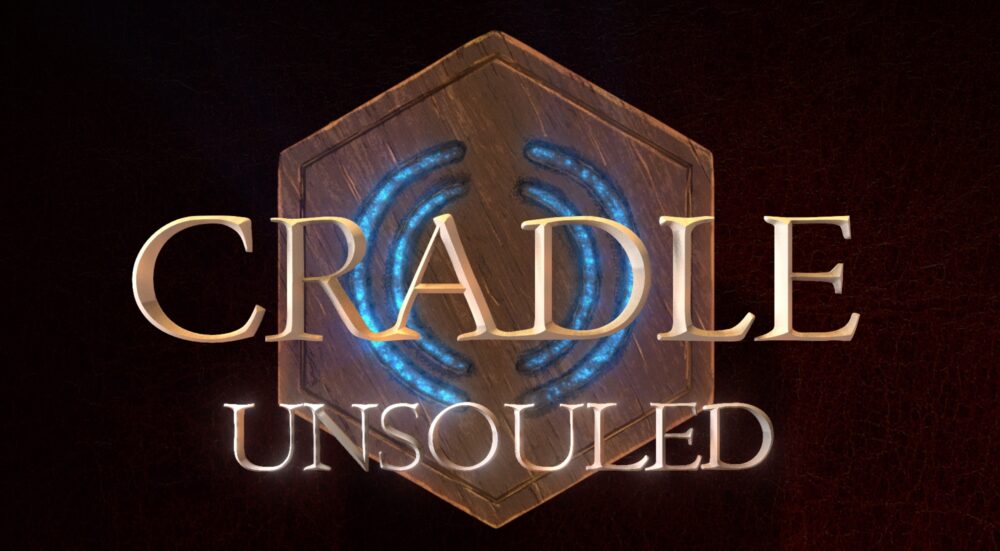
 Interviews17 hours ago
Interviews17 hours agoComic-Con 2024: Will Wight’s Cradle



